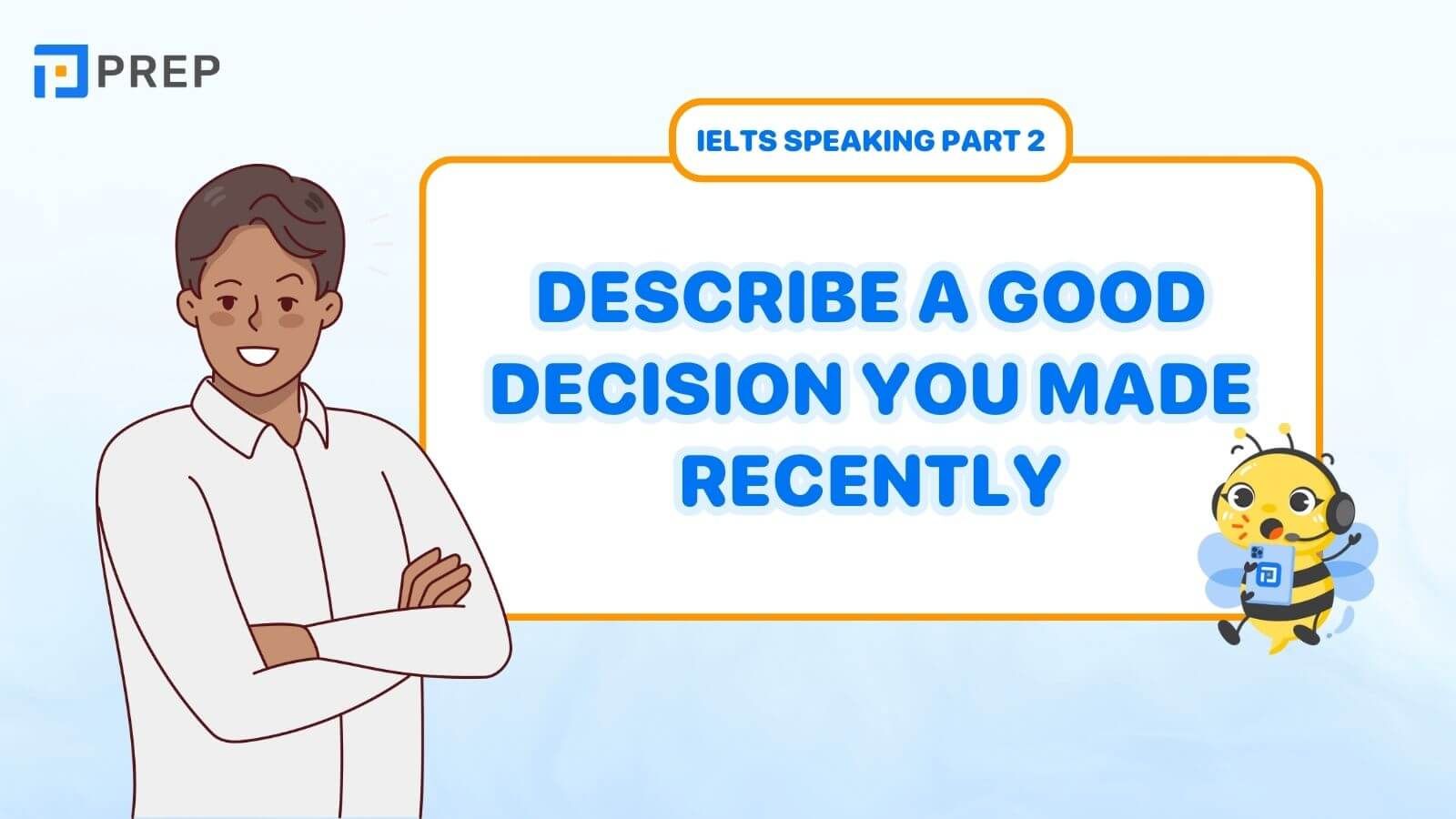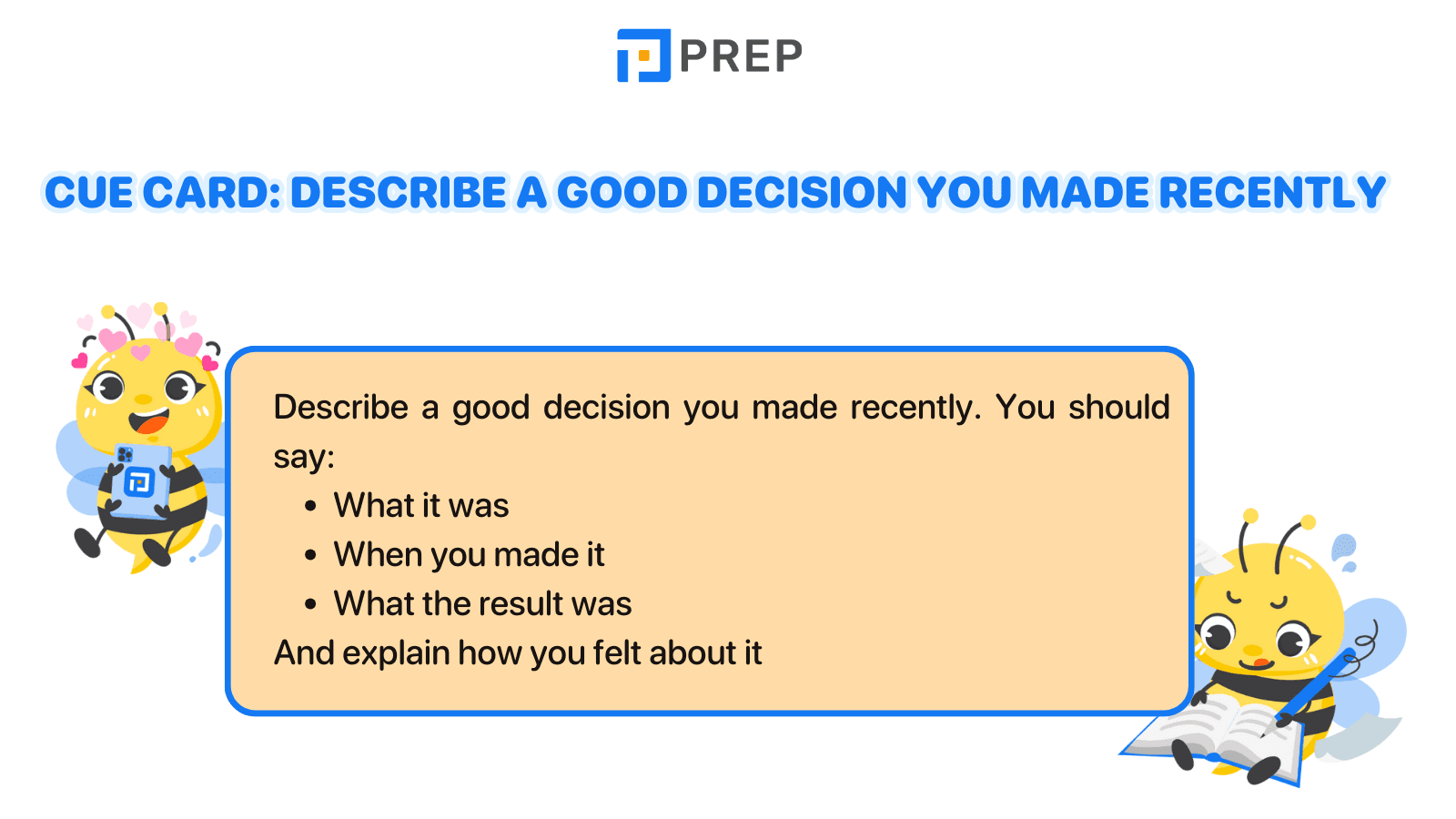Sample Speaking Part 2, 3: Describe a good decision you made recently
The IELTS Speaking Part 2 topic "Describe a good decision you made recently" is quite new compared to the topics that test-takers are currently practicing. This is not an overly complex topic, however, if you don't have an outline prepared, you may end up developing your response in a rambling, illogical way and appear flustered in front of the examiners. Therefore, below is an outline, some ideas, notes to take in 1 minute, and a detailed sample response.
Refer to the article below to effectively practice the Speaking section at home and achieve a high band score on your actual test!
- I. IELTS Speaking Part 2 question and answer: Describe a good decision you made recently
- II. Sample IELTS Speaking Part 3: Decision making
- 1. What kinds of decisions do people usually make in their daily life?
- 2. What should people do when making a hard decision?
- 3. Do you think it is easier to make a decision by yourself or by discussing it with others?
- 4. Why do you think many young people don’t like to follow their parents’ advice?
- 5. What should people do to make better decisions?

I. IELTS Speaking Part 2 question and answer: Describe a good decision you made recently
1. Cue card: Describe a good decision you made recently
Describe a good decision you made recently. You should say:
-
What it was
-
When you made it
-
What the result was
And explain how you felt about it

2. Outline: Part 2
2.1. Sample idea
-
The topic "Describe a good decision you made recently" requires test-takers to describe a wise decision they made, including the following information:
-
What was the decision?
-
When did you make that decision?
-
What were the results/outcomes?
-
Express your personal feelings/perceptions about that decision.
-
-
Question 1: What was the decision?
-
Question 2: When did you make that decision? In the "Describe a good decision you made recently" task, you can tell a story about when you made the decision, the context, and how you thought and deliberated before making that decision. Note: Use the simple past tense in this response.
-
Question 3: What were the results/outcomes? Describe how the decision turned out, whether it was as you had imagined or different. Note: Use the simple past tense in the "Describe a good decision you made recently" response.
-
Question 4: Express your personal feelings/perceptions about that decision: This section on personal feelings/perceptions does not necessarily have to be at the end of the "Describe a good decision you made recently" response. In general, this is where you can use adjectives to describe your emotions and impressions.
2.2. One-minute note taking
Please use a pen to take note of the main points in the passage as shown below:
|
What it was |
|
|
When you made it |
|
|
What the result was |
|
|
Explain how you felt about it |
|
3. IELTS Speaking Task 2 samples: Describe a good decision you made recently
Below is a sample IELTS Speaking Part 2 answer on the topic "Describe a good decision you made recently", compiled by the teachers at PREP. Refer to it to effectively practice the IELTS Speaking section at home!

Let’s take a look at the IELTS Part 2 Speaking examples - "Describe a good decision you made recently":
I recently made a decision that I consider one of my best ever, that is to apply to where I'm working right now. It's an ed-tech company that specializes in creating and selling education products. The name is Prep. Most of the online courses that are being sold are IELTS-oriented, but TOEIC courses are getting published soon.
The story is, a few months ago, while I was working at my then workplace, a school whose name I rather not tell, I got a message from my friend, asking if I want to apply for a job at Prep. She then proceeded to mail me the Job Description, and I have to say, the JD was pretty appealing. It had everything I could wish for, from the job itself to the salary. But I still had a hard time deciding, because my job at the time was still considered a dream job for many. But I guess you know what happened next, I changed my job anyway.
And that was the right call. My first impression was that it was such a supportive and friendly working environment. I was welcomed warmly the very first day at the office, as my manager promptly introduced me to the team and organized a game to break the ice. All of my new co-workers helped me a lot to get up to speed and ready for work. They are also pretty humorous though, and I cannot keep a straight face around them.
Oh, and the job, it is a fulfilling one, as I got the chance to do what I know best: education. The place is unlike many other traditional English centers, as it focuses less on money, and more on education and technology, which just happens to match my description of what my dream job should be.
All in all, I would say that I would never regret my decision to work at this office, and I am enjoying every single moment here.
Vocabulary used in the IELTS Speaking Part 2 sample response "Describe a good decision you made recently":
-
apply to: submit your CV to a school/company
-
then (adj) at that time
-
then workplace: the workplace at that time (the one mentioned)
-
appealing (adj) attractive, interesting
-
have a hard time doing sth: have a difficult time doing something
-
(make) the right call: (make) the right decision
-
(get) up to speed: have full information about an issue, catch up with everyone, and be ready to do well
-
keep a straight face: maintain a serious expression, especially when holding back laughter
-
fulfilling (adj) satisfying
-
happen to V: happen to [verb]
II. Sample IELTS Speaking Part 3: Decision making
Let's take a look at the IELTS Speaking Part 3 sample response on the topic of "Decision making"
1. What kinds of decisions do people usually make in their daily life?
Deciding what to wear is one that most people have to make every day. what type of shirt, what color of pants, what kind of shoes, what accessories and everything. It often takes a considerable amount of time for many to pick and choose. The founder of Facebook, Mark Zukerberg is a rare exception, as he chooses to wear the same blue shirt, pair of jeans, and pair of running shoes daily so that he can shift his attention to the more important decisions.
-
and everything (informal) - Used after mentioning one or a list of items to imply there are more things as well.
-
pick and choose - To carefully consider and select (more than is strictly necessary)
2. What should people do when making a hard decision?
When facing a hard decision, people should really slow down and think it through. The reason is during such tough moment, human tends to get an adrenaline rush and cannot make the best decision. By slowing things down, they can curb the effect of hormones, and have more time to consider everything as well.
In addition, meditation is also another way of gaining mental clarity, as it cultivates awareness and clears the mind of other thoughts to help people make smarter choices.
-
think sth through: to think carefully and thoroughly about something
-
adrenaline rush: a state of extreme stress and excitement due to a sudden increase in adrenaline
-
curb (v), (n): to limit or restrain, a restraint
3. Do you think it is easier to make a decision by yourself or by discussing it with others?
Most of the time, deciding by myself is easier since I don't have to argue with anybody, I can just do things the way I like. But of course, it gets a little complicated when my decision affects people around me. For example, when I need to organize a trip for a group of friends, it is very difficult for me to single-handedly decide on what is best for everyone.
Some may like going somewhere near the city, some may prefer a budget hotel, and so on. In such cases, it is much easier to just discuss with everybody.
-
argue with sb: to debate or dispute with someone
-
single-handedly (adv): alone, without the help of others
-
budget (adj) - economical, inexpensive
-
budget trip: an economical/inexpensive trip
-
budget hotel: an inexpensive hotel
4. Why do you think many young people don’t like to follow their parents’ advice?
It is a natural tendency for the youth, especially during their teenage years, to resist their parents' advice. This so-called teenage rebellion is part of growing up, when teens are trying to find their independence as well as their own identities. Breaking the law, driving fast, not obeying teachers, etc. Such insubordinate actions may push parents' patience but sometimes they are needed for children to develop, and they will mostly fade away by the time teens reach adulthood.
-
tendency (n) - a general inclination or direction
-
rebellion (n) - an act of armed resistance to an established government or leader
-
insubordinate (adj) - not submissive to authority, disobedient
-
reach adulthood - to attain the age of majority, to become an adult
5. What should people do to make better decisions?
Practicing mindfulness daily is a helpful exercise for better decision making. This is because people are constantly bombarded by a lot of information, ideas and thoughts that are irrelevant and could cloud their judgement.
For example, it would be very difficult for a manager to make a big financial investment if music, street noises, reports from other departments and unrelated phone calls kept on getting into his head. Practicing mindfulness, such as meditating, is a possible cure, as it clear the mind of all the irrelevant thoughts and help people make better judgement calls.
-
get into sb's head - to intentionally distract or disrupt someone's concentration
-
judgement calls - decisions made based on subjective opinions, as there may not be a clear right answer
-
make judgement calls - to make decisions based on one's own judgment and perspective
This article has provided the most detailed sample IELTS Speaking Part 2 + 3 on the topic of "Describe a good decision you made recently". Please reference, apply, and write your own IELTS Speaking response while practicing at home. Additionally, if you need detailed feedback and correction, don't forget to enroll in the IELTS Online course at Prep and let our top-tier teachers guide you on your journey to achieving your target IELTS band score!

Hi I'm Chloe, and I am currently serving as an Product Content Administrator at Prep Education. With over five years of experience in independent online IELTS study and exam preparation, I am confident in my ability to support learners in achieving their highest possible scores.
Comment
Personalized roadmap
Most read












